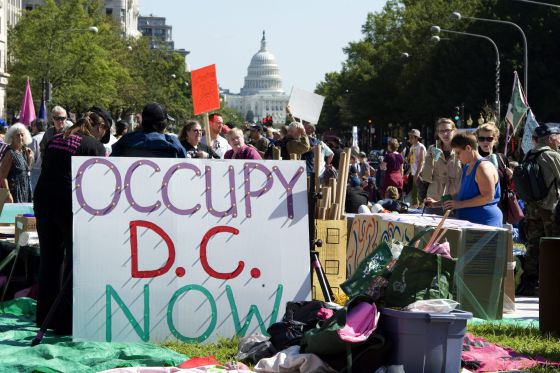From internet utopianism and dreams of democracy without leaders to visions of a new kind of stable global capitalism run by computers. We have paid a price for this: without realising it we, and our leaders, have given up the old progressive dreams of changing the world and instead become like managers – seeing ourselves as components in a system, and believing our duty is to help that system balance itself. Indeed, Adam Curtis says, "The underlying aim of "All watched over by machines of loving care" is to make people aware that this has happened – and to try to recapture the optimistic potential of politics to change the world."
The counterculture of the 1960s, the Californian hippies, took up the idea of the network society because they were disillusioned with politics and believed this alternative way of ordering the world was based on some natural order. So they formed communes that were non-hierarchical and self-regulating, disdaining politics and rejecting alliances. (Many of these hippy dropouts later took these ideas mainstream: they became the Silicon Valley entrepreneurs who decided that computers could liberate everyone and save the world.)
Another, rather different kind of fan of the network society was Alan Greenspan, for many years the world's most important central banker. "Greenspan believed that networks of computers, like networks of nature, could stabilise themselves". "Technology could turn everyone into heroic individuals, completely free to follow their own ideas." In his individualism, Greenspan was inspired by Ayn Rand, the Russian-born novelist who abhorred altruism, praised the "virtues of selfishness" and still has a massive following in the US 29 years after her death.
At first, the vision that machines had created a new stability seemed true. On Greenspan's watch, computers allowed investment banks to produce complex mathematical models that could predict the risk of making any loan or investment. If a risk could be predicted, it could be balanced by hedging against it. Hence, stability. There would be no more boom and bust. It was the "new economy".
That stability was, of course, an illusion; it was followed by the greatest economic crash since 1929. But, as Curtis says, the price of the bailouts was paid by ordinary people, via the state, rather than by the wealthy financiers who lost all the money in the first place. That's because, despite the illusion of ordered non-hierarchy, some people have vastly more power than others, and in many cases have had it for centuries.
Curtis draws a parallel with those 1970s communes. "The experiments with them all failed, and quickly. What tore them apart was the very thing that was supposed to have been banished: power. Some people were more free than others – strong personalities dominated the weak, but the rules didn't allow any organised opposition to the suppression because that would be politics." As in the commune, so in the world: "These are the limitations of the self-organising system: it cannot deal with politics and power. And now we're all disillusioned with politics, and this machine-organising principle has risen up to be the ideology of our age."
"The power of politicians has been taken by others, by financial institutions, corporations. After the crash, the elite used politicised power to rescue themselves. Politics was seen to have failed, to have been corrupt, empty."
"We never talk about power these days. We think we live in a non-hierarchical world, and we pretend not to be elitist now – which is, of course, an emotionally attractive idea, but it's just not true. And that's dangerous."



















